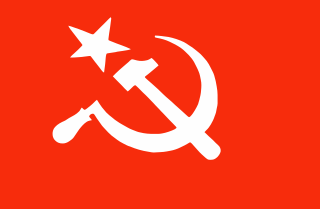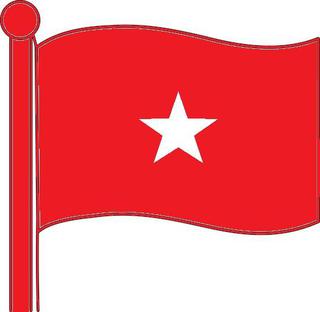Related Research Articles

The Communist Party of India (Marxist) is a communist political party in India. It is one of the national parties of India. The party emerged from a split from the Communist Party of India in 1964. The CPI(M) was formed in Calcutta from 31 October to 7 November 1964.
Workers Party of India is a political party in the Indian state of West Bengal. WPI has its origin in the Democratic Vanguard in India. DV was formed in 1943 when a group led by Jiban Lal Chattopadhyay broke away from the Radical Democratic Party of Manabendra Nath Roy. DV were dissatisfied with the development of RDP into a non-Marxist outfit. Jiban Lal Chattopadhyay had been elected secretary of the Bengal Congress in 1930.

The Socialist Unity Centre of India (Communist) or SUCI(C), previously called the Socialist Unity Centre of India and "Socialist Unity Centre" is a communist party in India. The party was founded by Shibdas Ghosh, Nihar Mukherjee and others in 1948.
Mohammed Salim is an Indian politician, belonging to the Communist Party of India (Marxist). He was inducted in the politburo of CPI(M) in the 21st party congress organised at Visakhapatnam in 2015. He was a member of the 16th Lok Sabha, representing Raiganj constituency. Earlier, he was a member of the 14th Lok Sabha, representing the Calcutta North East constituency of West Bengal. After delimitation, in the 2009 Lok Sabha election Salim contested the new Calcutta North constituency, and lost to Sudip Bandyopadhyay of the Trinamool Congress.
Basudeb Acharia is an Indian politician and a leader of the Communist Party of India (Marxist) political party. His family originally hails from Tamil Nadu but has been settled in Bengal for a few generations. He also considers himself to be a Bengali.
Mohammed Amin was an Indian politician from the Communist Party of India (Marxist), the largest communist party in India. He was a Vice President of the Centre of Indian Trade Unions.
Socialism in India is a political movement founded early in the 20th century, as a part of the broader movement to gain Indian independence from colonial rule. The movement grew quickly in popularity as it espoused the causes of India's farmers and labourers against the zamindars, princely class and landed gentry. Socialism shaped the principal economic and social policies of the Indian government but mostly followed Dirigism after independence until the early 1990s, when India moved towards a more market-based economy. However, it remains a potent influence on Indian politics, with many national and regional political parties espousing democratic socialism.

The Bolshevik Party of India is an Indian political party in India. The party was founded in 1939. The party had a certain role in the trade union movement in West Bengal and was briefly represented in the state government in 1969. In later years the party has played a negligible role in Indian politics.
Surjya Kanta Mishra is an Indian politician, belonging to the Communist Party of India (Marxist). He served as Minister of Health and Minister in-charge of Land & Land Reforms, Panchayats & Rural Development in the Left Front governments of West Bengal and is the Secretary of the Communist Party of India (Marxist), West Bengal State Committee. After the 2011 assembly election he was elected as Leader of the Opposition in the West Bengal Legislative Assembly in May 2011. He was inducted into the politburo of the CPI(M) following the death of veteran leader M.K. Pandhe in 2011. In 2015, he was elected as the state secretary of CPI(M) in West Bengal, succeeding Biman Bose.
Satyapriya Banerjee was an Indian politician and trade unionist.
Legislative Assembly elections was held in the Indian state of West Bengal on 14 June 1977. The polls took place after the ousting of Indira Gandhi's government at the Centre. The Left Front won a landslide victory. The 1977 election marked the beginning of the 34-year Left Front rule in West Bengal, with Communist Party of India (Marxist) leader Jyoti Basu leading the first Left Front cabinet.
Legislative Assembly elections were held in the Indian state of West Bengal in 1991. The election took place simultaneously with the 1991 Indian general election. The term of the assembly elected in 1987 lasted until February 1992, but the West Bengal government asked the Election Commission of India to arrange the election at an earlier date.
Legislative Assembly elections were held in the Indian state of West Bengal in 1996.
Abu Asad Mohammed Obaidul Ghani (1903–1973), also referred to as A.M.O. Ghani, was an Indian politician, belonging to the Communist Party of India.
Professor Jyotibhushan Bhattacharya was an Indian politician and scholar. He served as general secretary of the Workers Party of India. He served as a Minister in both of the United Front governments in West Bengal.
Mohammed Abdullah Rasul was an Indian politician. He belonged to the Communist Party of India (Marxist). M.A. Rasul was a prominent leader of the peasants' movement and served as minister in the West Bengal state government for a short period in the 1960s.
Krishnapada Ghosh (1914–1987) was an Indian politician and trade unionist. He served as West Bengal Minister of Labour 1969–1970 and 1977–1985. He was a Central Committee member of the Communist Party of India (Marxist). He was also a member of the Working Committee of the Centre for Indian Trade Unions.
Mohammed Elias Razi was an Indian politician, belonging to the Workers Party of India. He was elected four times to the West Bengal Legislative Assembly, being elected from the Harishchandrapur constituency in 1957, 1967, 1969 and 1971.
A. H. Besterwitch was an Indian politician and trade unionist. He belonged to the Revolutionary Socialist Party. As of the 1960s and 1970s, he served as general secretary of the Dooars Cha Bagan Workers’ Union, a trade union of tea plantation labourers in northern West Bengal. He was elected to the West Bengal Legislative Assembly in the 1962, 1969, 1971, 1972 and 1977 elections. He led the RSP faction in the Legislative Assembly. Besterwitch died in 1979.
Bazle Ahmad was an Indian politician and trade unionist, belonging to the Socialist Unity Centre of India. By the mid-1960, he served as president of the UTUC -affiliated Sahebganj Loop Rail Sramik Union. He represented the Murarai constituency in the West Bengal Legislative Assembly 1967-1972. In the 1967 West Bengal Legislative Assembly election, he obtained 14,944 votes (41.37%). In the 1969 West Bengal Legislative Assembly election, he obtained 22,766 votes (54.14%). As a legislator he managed to convince the state government to set up a tertiary educational facility in his constituency, leading to the foundation of the Kabi Nazrul College. In the 1971 West Bengal Legislative Assembly election, he obtained 16,310 votes (53.73%). Bazle Ahmed lost the Murarai seat in the 1972 West Bengal Legislative Assembly election, finishing in second place with 11,627 votes (29.49%).
References
- 1 2 Communist Party of India (Marxist). West Bengal State Committee. Election results of West Bengal: statistics & analysis, 1952-1991. The Committee. p. 401. ISBN 9788176260282.
- 1 2 People's Democracy. Comrade Mohammed Nizamuddin [ dead link ]